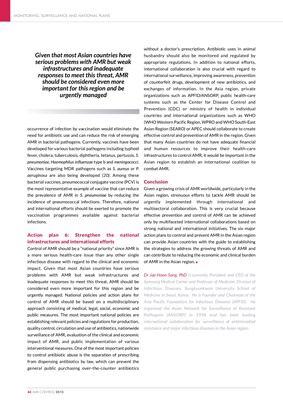
occurrence of infection by vaccination would eliminate the
need for antibiotic use and can reduce the risk of emerging
AMR in bacterial pathogens. Currently, vaccines have been
developed for various bacterial pathogens including typhoid
fever, cholera, tuberculosis, diphtheria, tetanus, pertussis, S.
pneumoniae, Haemophilus influenzae type b and meningococci.
Vaccines targeting MDR pathogens such as S. aureus or P.
aeruginosa are also being developed (20). Among these
bacterial vaccines, pneumococcal conjugate vaccine (PCV) is
the most representative example of vaccine that can reduce
the prevalence of AMR in S. pneumoniae by reducing the
incidence of pneumococcal infections. Therefore, national
and international efforts should be exerted to promote the
vaccination programmes available against bacterial
infections.
Action plan 6: Strengthen the national
infrastructures and international efforts
Control of AMR should be a "national priority" since AMR is
a more serious health-care issue than any other single
infectious disease with regard to the clinical and economic
impact. Given that most Asian countries have serious
problems with AMR but weak infrastructures and
inadequate responses to meet this threat, AMR should be
considered even more important for this region and be
urgently managed. National policies and action plans for
control of AMR should be based on a multidisciplinary
approach consisting of medical, legal, social, economic and
public measures. The most important national policies are
establishing relevant policies and regulations for production,
quality control, circulation and use of antibiotics, nationwide
surveillance of AMR, evaluation of the clinical and economic
impact of AMR, and public implementation of various
interventional measures. One of the most important policies
to control antibiotic abuse is the separation of prescribing
from dispensing antibiotics by law, which can prevent the
general public purchasing over-the-counter antibiotics
without a doctor's prescription. Antibiotic uses in animal
husbandry should also be monitored and regulated by
appropriate regulations. In addition to national efforts,
international collaboration is also crucial with regard to
international surveillance, improving awareness, prevention
of counterfeit drugs, development of new antibiotics, and
exchanges of information. In the Asia region, private
organizations such as APFID/ANSORP, public health-care
systems such as the Center for Disease Control and
Prevention (CDC) or ministry of health in individual
countries and international organizations such as WHO
(WHO Western Pacific Region, WPRO and WHO South-East
Asian Region (SEARO) or APEC should collaborate to create
effective control and prevention of AMR in the region. Given
that many Asian countries do not have adequate financial
and human resources to improve their health-care
infrastructures to control AMR, it would be important in the
Asian region to establish an international coalition to
combat AMR.
Conclusion
Given a growing crisis of AMR worldwide, particularly in the
Asian region, strenuous efforts to tackle AMR should be
urgently implemented through international and
multisectoral collaboration. This is very crucial because
effective prevention and control of AMR can be achieved
only by multifaceted international collaborations based on
strong national and international initiatives. The six major
action plans to control and prevent AMR in the Asian region
can provide Asian countries with the guide to establishing
the strategies to address the growing threats of AMR and
can contribute to reducing the economic and clinical burden
of AMR in the Asian region. l
Dr Jae-Hoon Song, PhD is currently President and CEO of the
Samsung Medical Center and Professor of Medicine, Division of
Infectious Diseases, Sungkyunkwan University School of
Medicine in Seoul, Korea. He is Founder and Chairman of the
Asia Pacific Foundation for Infectious Diseases (APFID). He
organized the Asian Network for Surveillance of Resistant
Pathogens (ANSORP) in 1996 and has been leading
international collaboration for surveillance of antimicrobial
resistance and major infectious diseases in the Asian region.
MONITORING, SURVEILLANCE AND NATIONAL PLANS
44 AMR CONTROL 2015
Given that most Asian countries have
serious problems with AMR but weak
infrastructures and inadequate
responses to meet this threat, AMR
should be considered even more
important for this region and be
urgently managed